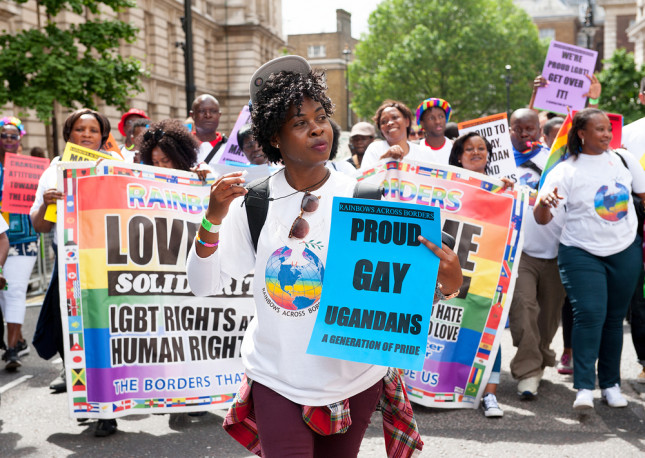-
Uganda’s Anti-Homosexuality Act: Criminalization’s Impact on HIV and AIDS Response
June 29, 2023 By Sophia DeLuca
Four months ago, the resident medical officer at the HIV and AIDS clinic in Kampala, Uganda reported that the clinic treated up to 50 patients a day. Now, the clinic is relatively empty, and supplies of antiretroviral therapy (ART) pile up, unused.
The community’s need for ART, prevention tools, and surveillance hasn’t changed, but one patient said that fear of coming to the clinic has increased since the Ugandan Parliament passed the Anti-Homosexuality Act, which President Yoweri Museveni signed into law on May 29, 2023. The law penalizes homosexual behavior and “promoting” homosexuality with 20 years in prison. Additionally, “aggravated homosexuality,” which includes same-sex sexual acts involving people who are living with HIV (PLHIV), can be punished with the death penalty.
The public health risks of such legislation are real. A restrictive and punitive legal environment, like the one in Uganda, causes structural stigma: “a macrosocial form of stigma acting at the level of policies, systems, and structures.” The Joint United Nations Programme on HIV and AIDS (UNAIDS) recognizes stigma as a risk factor that isolates key populations—including men who have sex with men (MSM)—from life-saving treatment and prevention services.
Ugandan Health Minister Dr. Jane Ruth Aceng Ocero claimed on Twitter that the new law will not impact HIV and AIDS transmission or treatment: “The Government of Uganda will ensure that prevention programs for HIV Epidemic control remains accessible to those that need them in a non-discriminatory manner observing principles of confidentiality and equity.”
Yet while Dr. Ocero asserts that the Anti-Homosexuality act will cause no disruption to the provision of essential HIV and AIDS services in Uganda, research published in The Lancet HIV Journal on HIV and AIDS and the criminalization of homosexuality suggests otherwise.
This study, led by researchers at Johns Hopkins School of Public Health, found that MSM in countries that criminalize homosexuality are five times more likely to be living with HIV than MSM living in countries that do not criminalize homosexuality. This risk increases to 12 times more likely in settings where there have been legal prosecutions for “consensual same-sex sexual acts” in the past year. This increased risk is likely due to low levels of testing and status awareness due to fear of prosecution, most prevalent in countries with severe anti-LGBTQ+ legal environments.
In addition to the criminalization of homosexuality, the study found that laws restricting the operation of civil society organizations (CSOs) are also detrimental to progress against HIV and AIDS. These CSOs support health services and engage in necessary outreach and advocacy, especially for key populations. But because Uganda’s Anti-Homosexuality act criminalizes the promotion of homosexuality, some healthcare providers in Uganda are already concerned that treating LGBTQ+ patients could be equated with promoting homosexuality—and that they could face legal repercussions simply for providing care.
Criminalization also impacts the portion of PLHIV who know their status, and who are virally suppressed. A 2021 article published in BMJ Global Health found that in countries that criminalized homosexuality, knowledge of status was 11% lower and viral suppression was 8% lower than in countries without criminalization. Similar trends also were associated with both the criminalization of sex work and drug use.
While discriminatory laws appear to halt progress in fighting the HIV and AIDS epidemic, protective, non-discrimination laws do offer a solution to the barriers that stigma creates. Such laws (and strong institutions that protect human rights) are associated with higher knowledge of status and viral suppression among PLHIV. However, just 23 percent of countries have non-discrimination laws that protect sexuality, gender-identity, and HIV status.
The evidence is clear: increased criminalization of LGBTQ+ communities in Uganda will create setbacks in progress to fight HIV and AIDS within the country. Yet the Anti-Homosexuality act will not go unchallenged. Uganda’s LGBTQ+ activists have already filed a petition in the constitutional court.
There has been global backlash, as well. In a joint statement, UNAIDS, the Global Fund, and the U.S. President’s Emergency Plan for AIDS Relief (PEPFAR) all drew attention to the dangerous implications of the new Ugandan law on HIV and AIDS: “Uganda’s progress on its HIV response is now in grave jeopardy. The Anti-Homosexuality Act 2023 will obstruct health education and the outreach that can help end AIDS as a public health threat.”
Read more:
- Sustaining PEPFAR’s Success through Integration, Equity, and Inclusion
- Most LGBTQ+ Individuals Remain in the “Global Closet”–At Great Cost to Global Health
- Beyond Pride: Ensuring Affirming, Respectful Sexual and Reproductive Healthcare for LGBTQ+ Communities
Sources: BMJ Global Health, Joint United Nations Programme on HIV and AIDS, National Public Radio, Reuters, The Lancet HIV Journal.
Photo Credit: London Pride 2016. John Gomez/Shutterstock.com.
 A Publication of the Stimson Center.
A Publication of the Stimson Center.






